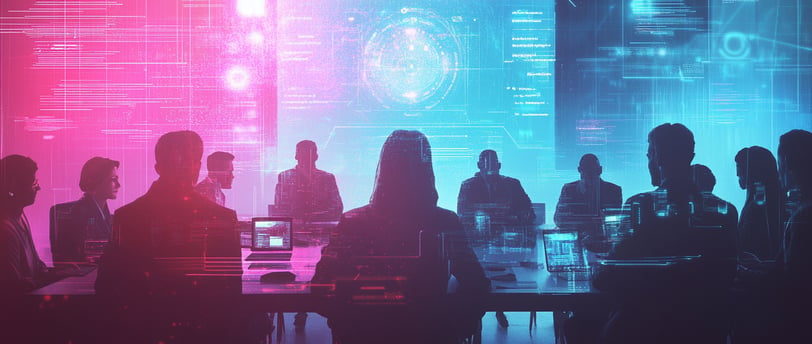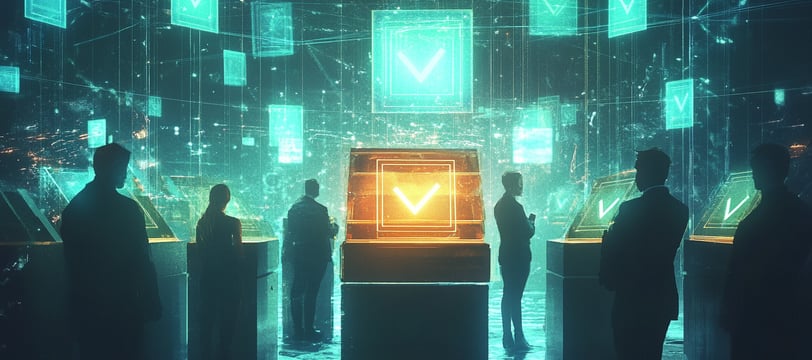Unlocking the Potential of DAOs: The Decentralized Future of Organizations
Discover how Decentralized Autonomous Organizations (DAOs) are revolutionizing governance, collaboration, and innovation. Learn how DAOs work, their advantages, and the industries they’re disrupting in this in-depth guide.
VaultKeyPress
3/4/20255 min read


What Are DAOs?
At their core, Decentralized Autonomous Organizations (DAOs) are organizations governed by smart contracts and run by a decentralized community of stakeholders rather than centralized leadership.
Key characteristics of DAOs:
Decentralized: No central authority or leader; decisions are made collectively by members.
Autonomous: Operates using pre-written smart contracts that execute actions automatically.
Transparent: All transactions, votes, and governance decisions are recorded on a public blockchain.
How DAOs Work
Smart Contracts: Smart contracts form the backbone of DAOs, containing the rules and logic for the organization. For example, MakerDAO’s smart contracts govern how its DAI stablecoin operates. Learn more about MakerDAO here.
Governance Tokens: Members hold governance tokens, representing voting power. These tokens allow members to propose, vote, and implement changes.
Treasury: Many DAOs maintain a treasury of funds in the form of cryptocurrencies, which can only be spent based on collective agreement.
Advantages of DAOs
DAOs are a revolutionary step forward, offering benefits that traditional organizations can’t match:
1. Democratized Decision-Making
In DAOs, every token holder has a say in decision-making. This ensures that power is distributed rather than concentrated in the hands of a few.
2. Global Collaboration
DAOs transcend borders, allowing individuals from around the world to participate. Blockchain’s decentralized nature ensures that geography is no barrier to governance or collaboration.
3. Transparency
All decisions and transactions are recorded on the blockchain, ensuring transparency. This drastically reduces the risk of fraud or corruption.
4. Cost Efficiency
DAOs reduce administrative overhead by automating processes like payroll, voting, and contract execution through smart contracts.
5. Innovation and Flexibility
Because DAOs are decentralized and agile, they can quickly adapt to changes or experiment with new ideas without bureaucratic delays.
Industries Being Disrupted by DAOs
1. Finance and DeFi
DAOs are integral to Decentralized Finance (DeFi), managing lending pools, yield farming protocols, and decentralized exchanges.
Example: MakerDAO governs the DAI stablecoin, enabling community-driven decisions on collateral requirements and interest rates.
2. Gaming
Gaming DAOs allow players to own and govern virtual economies, creating opportunities for play-to-earn models.
Example: Yield Guild Games (YGG) is a DAO that invests in virtual gaming assets, enabling players to earn rewards by participating in blockchain-based games.
3. Media and Content Creation
DAOs are transforming media by empowering creators to collaborate without intermediaries and directly monetize their work.
Example: Mirror.xyz allows writers to crowdfund articles, where supporters receive governance tokens in return.
4. Venture Capital
DAOs enable collective investing, allowing participants to pool funds and make investment decisions together.
Example: The LAO is a venture capital DAO that invests in blockchain startups, with members voting on which projects to fund.
5. Social Impact
DAOs can address social issues by funding initiatives transparently and democratically.
Example: Gitcoin DAO funds open-source projects and community initiatives through collective decision-making.
6. Real Estate
Tokenizing real estate ownership through DAOs allows for fractional ownership and collective management of properties.
Challenges Facing DAOs
While DAOs are promising, they face several challenges that must be addressed:
1. Legal Uncertainty
Governments have yet to establish clear legal frameworks for DAOs. This ambiguity can deter participants and investors.
2. Governance Risks
Low voter turnout and token concentration (where a few members hold most tokens) can lead to governance failures.
3. Security Vulnerabilities
Smart contract bugs or exploits can result in significant losses, as seen in The DAO hack in 2016, where $50 million was stolen.
4. Complexity
Understanding and participating in DAOs require technical knowledge, which can be a barrier for newcomers.
5. Scalability
As DAOs grow in size, decision-making can become slower and less efficient.
The Future of DAOs
The future of DAOs lies in their ability to evolve and overcome current limitations. As legal frameworks develop and blockchain technology advances, DAOs will become more accessible and powerful. Key trends include:
Interoperability: DAOs will integrate across blockchains for seamless collaboration.
AI Integration: As discussed in The Rise of AI in Blockchain, artificial intelligence could assist in governance by analyzing data and proposing optimized decisions.
Mainstream Adoption: As people become more familiar with blockchain, DAOs could be used for everything from local governments to global initiatives.
Decentralized Autonomous Organizations represent a paradigm shift in how organizations are structured and governed. By leveraging blockchain technology, DAOs empower communities to collaborate transparently, efficiently, and equitably. While challenges remain, the potential for DAOs to disrupt industries and democratize power is immense.
As DAOs evolve, they will likely play a critical role in shaping the decentralized future of work, governance, and innovation. For those looking to stay ahead of the curve, understanding and participating in DAOs is an opportunity to be part of a transformative movement.
Curious to Learn More?
For more insights into blockchain, DAOs, and the future of crypto, subscribe to our mailing list and stay updated on the release of Crypto Unlocked: The Modern Guide to Digital Wealth.
This guide covers everything from understanding blockchain fundamentals to long-term investment strategies tailored for the modern age.
👉 Sign up here for exclusive updates and to secure your copy of Crypto Unlocked before its release!
Imagine a world where businesses and organizations are run not by CEOs or boards but by code and community consensus. Decentralized Autonomous Organizations, or DAOs, are making this a reality. Built on blockchain technology, DAOs are reshaping how we think about governance, decision-making, and ownership. From enabling fairer resource distribution to disrupting traditional industries, DAOs represent a new frontier in organizational structures.
To understand where DAOs fit in, consider their role in the broader evolution of money and technology, as explored in The Evolution of Money. DAOs build on these advancements to create transparent, collaborative structures for the future.
In this blog, we’ll explore what DAOs are, how they work, their advantages, and the industries they’re disrupting. By the end, you’ll have a comprehensive understanding of why DAOs are being hailed as the decentralized future of organizations.










Unlock your financial future with our insights.
© 2024 VaultKey Press. All Rights Reserved.




